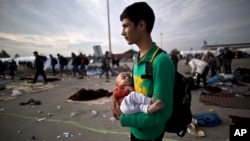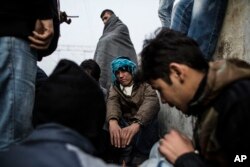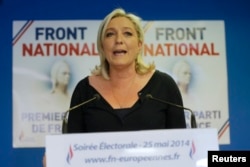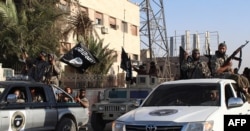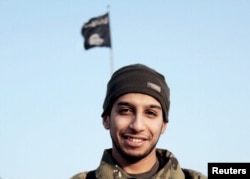In the rays of an unseasonable, autumnal Serbian sun, a dozen or so scruffy Afghani boys kick a discolored orange football around in a Belgrade park once notorious as a streetwalkers’ hangout but now renamed Afghan Park.
The teenagers have little cash in the pockets of the jackets they have been given by local charities, and they aren’t sure how they’ll reach the promised lands of Germany and Scandinavia.
One of them wanted to go to Belgium. But for now, as they lark around with lunching Serbian office-workers casting sidelong glances their way, they haven’t a care in the world — it has finally dawned on them that they have escaped the clutches of Afghanistan’s Taliban, and a new life beckons.
One of the bewildering ironies of the European influx of refugees from war-torn Afghanistan, Syria, Iraq and Somalia is that many of the men and young boys making the perilous journey across harsh terrain and stormy seas, and enduring beatings by border guards in some countries, are doing so to flee jihadist gangs such as the Islamic State group, Taliban or al-Shabab.
Meanwhile, a much smaller number of disgruntled and often marginalized second and third generation European Muslim immigrants are making the journey in the opposite direction and for a different reason. Much of their travel is easier — they just buy an air ticket with a low-cost carrier to start their jihad.
Bismillah, 16, said he doesn’t understand why Western boys would be heading to join the jihadists.
He fled Afghanistan, without his father’s prior knowledge but with his mother’s encouragement, because the Taliban was insisting he enlist.
“I didn’t want to fight for the Taliban, I want to finish school and get an education,” he said. The blue-eyed Bismillah liked his home. As he looks around the alien setting of Afghan Park, he mentions fondly two pomegranate trees in the garden of his family’s small house.
“My mom told me to go but not to tell my father — he would have stopped me. He is afraid of the Taliban,” he added.
VOA talked with another group of Afghani teenagers in the Serbian capital last week, who told similar stories. In their home town, however, it was not only the Taliban telling their parents they had to join: it was also the Islamic State group.
“We had to choose one or the other,” said Khalil, a 15-year-old. Another boy told how his uncle and aunt had to hide their son and pretend he had died while they plotted ways of getting him out of the country.
Misconstrued intentions
All of the boys voiced anxiety about Europeans viewing them as jihadists or potential terrorists, and the news of the Paris terror attacks has added to their concern. They are becoming increasingly alarmed about the impact the attacks may have on them, fearing borders will be closed to them and that they will be met with hostility even in northern Europe.
“We aren’t jihadists,” said Bismillah.
The chances of border closings have increased dramatically since Islamic State militants killed 129 people and wounded 352 others in Paris on Friday.
In the immediate aftermath of the Paris attacks, Poland's European affairs minister, Konrad Szymanski, announced his country cannot accept migrants under European Union quotas. “In the face of the tragic acts in Paris, we do not see the political possibilities to implement [this],” he said.
Even before the Paris attacks, European officials were increasingly expressing concern that Islamic State was using the tens of thousands of refugees making their way into Europe every week as cover to hide jihadists. And the group hasn’t lost an opportunity to fuel a mainly tabloid media hue-and-cry in Europe about the dangers lurking among the refugees.
“Just wait,” one jihadist smuggler told the American news site BuzzFeed in September. “They are going like refugees” he said, explaining how ISIS [Islamic State] is slipping battle-hardened fighters among the chaotic human torrent of asylum-seekers. He claimed the terror group “had sent some 4,000 fighters to Europe.”
Call to stop migrant intake
With at least one of the Paris gunmen, and possibly two, having slipped into France posing as a refugee, far-right parties in Europe have seized on the risks of admitting war refugees and migrants.
Earlier this week, Marine Le Pen, the leader of France’s nationalist, far-right National Front party, called for an “immediate halt” to the intake of migrants into France. She said her “fears and warnings of the possible presence of jihadists among the migrants entering our country" had been borne out.
Leftist and right-wing European governments are fearful of the possible electoral consequences of continuing to admit refugees. Still, French President Francois Hollande has thus far led the way in insisting that there is a humanitarian duty to continue admitting refugees, while maintaining vigilance and ensuring proper security checks.
”France will remain a country of freedom,” he said earlier this week, defending his decision to honor a commitment to accept migrants and refugees despite Friday’s deadly terrorist onslaught. “Thirty-thousand refugees will be welcomed over the next two years. Our country has the duty to respect this commitment,” he said.
Humanitarian duty aside, French officials say if Europe did shut out Muslim refugees, it would serve ISIS’s tactical purposes, allowing the terror group to use this as further evidence that Europe is anti-Islam and helping it recruit angry and desperate refugees.
Doubt about IS claim
While not dismissing the danger of jihadists being disguised as refugees, some intelligence officials question the claim that ISIS has sent 4,000 fighters to Europe among the refugees.
A senior British intelligence official told VOA: “That would amount to virtually a quarter of the estimated foreign fighters ISIS has at the moment, and we know they have high need of them in Syria now with the likelihood of a ground assault being mounted against their stronghold of Raqqa.”
Other European intelligence officials said focusing only on the refugee tide risks missing other, often easier ways of getting European ISIS members back into Europe. They worry more about the failure to check returning fighters from Syria when they arrive at European airports, arguing checks on European passport holders are cursory.
Few immigration officials bother to consult the European Union’s anti-terrorism watch-list and 80 percent of the time just inspect EU passports visually with no follow-up.
Belgium national Abdelhamid Abaaoud, the militant French prosecutors say was the mastermind of Friday’s attacks, bragged publicly earlier this year that he had no difficulty traveling back and forth from Syria to his Belgian home several times. He noted that despite an international arrest warrant, border guards failed to recognize him.
There is no mistaking that Bismillah and his friends hanging out in Belgrade's Afghan Park are refugees. They just hope they won’t be mistaken for jihadists.




